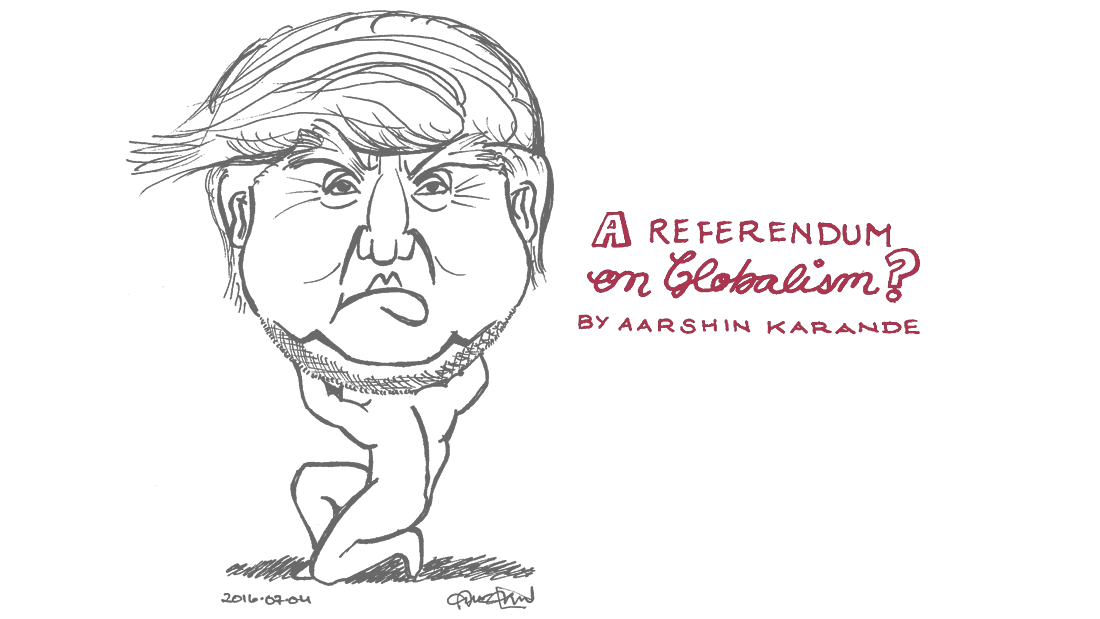
What the energy surrounding Trump, Sanders, and Brexit tells us about why globalization hasn’t been great for everyone (so far).
It has been a long, long week here in London. The city is still reeling from the disorientation provoked by the decision to leave the European Union on June 23. And, by all accounts, this is just the beginning.
As an American student studying in London, the past week has been intriguing and terrifying. I have witnessed disorder and uncertainty descend upon a city and country that has reliably stood the test of time. As an adoptive Londoner, I’ve experienced a hectic range of emotions since the referendum. First, fury about the demonstrated lack of faith in multilateral democratic coordination represented by the EU. Next, disgust with expressions of xenophobia, nativism, and racism documented by the news media. Then, I wrestled with self-pity; feeling my adoptive country had made a decision about its future that didn’t include values held dear by me and my generation: diversity, globalism, and progressivism.
But, then I took a breath, and humbled myself by considering what this was really about; that it might not be about me or any specific creed or peoples. Surely, among the many reasons to leave the EU, 52% of the United Kingdom didn’t vote to leave simply out of xenophobia, racism, and nativism? It is likelier that those who voted “Leave” were voting for something bigger: To disrupt “the system” and exercise a power they felt has become powerless. Reports about voters regretting their decision to vote “Leave” seem to reflect this reality.
So, is this really about globalism? Or, has globalism become a symptom of a broader, veiled issue?
If we look to similar “populist” energy in the United States, Sen. Bernie Sanders and Mr. Donald Trump have also defied expectations in a way that Brexit did in the UK. But, at their core, these movements are anti-establishment in nature and point to a virally growing intolerance with the elite who have disproportionately benefited from the culture, politics, and economics of globalization.
We must recognize that those who voted “Leave” probably least felt the benefits of globalization or most felt its costs: working-class and middle-class British citizens. In the US, Sanders similarly gave voice to Americans whose wages haven’t increased in decades and whose jobs are being sent overseas. Trump, albeit irrationally, also taps into this sense of disenfranchisement and promises an America where the shame of perpetual mediocrity evaporates when America is made “great again.”
Not anti-globalism, but anti-elitism (whether political, cultural, economic, intellectual, or technological) seems to better characterize the populist movements that are taking hold in the West. Elites have benefited most from and are a product of globalization. The globalist infrastructure which benefits them have also bet against those who have yet to feel the various riches globalization can deal.
We are in the midst of a global uprising against elites; what Michael Wolf calls a “movement of the enraged.” Elites are perceived as having lost touch with the general public, whom they seem to tower over and look down upon. While issues like discrimination and violence inspired by these movements deserve scrutinous focus, a bigger drama has been brewing for some time which seems outside of the media’s immediate view.
Times are risky and unexpected, especially as these disruptive movements find success. The despair of the local will spread like wildfire throughout the globe – it already has. The first lesson of Brexit, Sanders, and Trump should be that we need to listen and feel more deeply about the problems facing the local, not just the global. At this point, mending this local-global relationship is not just a moral or sustainable imperative. As Brexit has shown, it’s an imperative for survival. Otherwise, local whispers of despair will develop into global screams of chaos that will silence any peace we have come to know, wherever that may be.
AARSHIN KARANDE is a graduate student at The London School of Economics and Political Science where he studies media and communication governance with interests in consciousness studies and design strategy.




No Comments